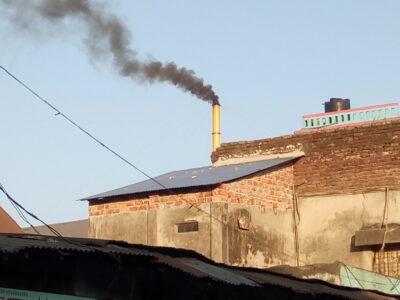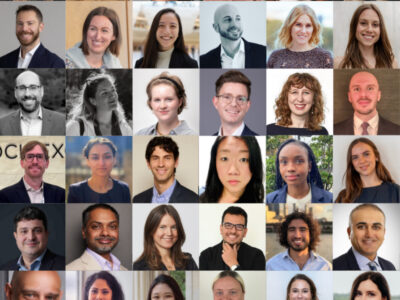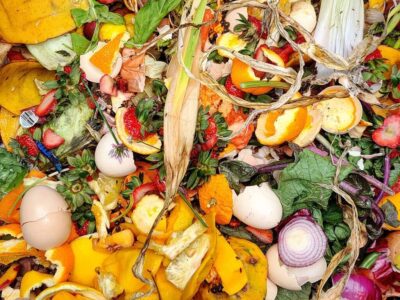
As the grandson of a former NYC cab driver, Gary Weinstein has long been fascinated by the unique opportunities and challenges urban transportation can offer. Now a Master of Science in Sustainability Management program (SUMA) alum, Weinstein remains passionate about developing and implementing large-scale sustainability initiatives in New York’s transportation industry.
During his studies at Columbia, Weinstein maintained an active role in sustainability advocacy by joining initiatives like the Build It Green club and co-founding Net Zero Avenue, a sustainability consultancy start-up.
These days, Weinstein finds fulfillment in his role as the sustainability manager at JFK Terminal 4, from engaging with employees and passengers to being presented with novel and ambitious challenges in sustainability thresholds. As Terminal 4 achieves recognition for its sustainability achievements, Weinstein continues to focus on advancing their goals and setting an example for other airport terminals.
In the conversation below, Weinstein sheds light on his career journey and offers invaluable advice to current and prospective students, emphasizing the importance of community engagement and forging one’s own path in solving sustainability challenges.
Why did you decide to focus on sustainability?
I’ve always been interested in environmental stewardship and ecological conservation. While I learned a lot throughout my 10-year career in financial services prior to the program, I felt like transitioning to a career path focused on sustainability would allow me to act on my eco-conscious passions and contribute my unique skill set to this growing field. The late and great Mahatma Gandhi’s quote, “be the change that you wish to see in the world,” resonates with me. By being a member of the wonderful sustainability community, I am at the forefront, provided with the opportunity to make meaningful impacts on our society for the benefit of current and future generations.
What influenced your decision to apply to the SUMA program? Did the experience live up to your expectations?
My decision to apply to the SUMA program was based on several factors. I aspired to join a top-tier academic and sustainability program with professors who are leaders in their respective sectors. In addition, the opportunity to join a robust alumni network in New York and internationally really intrigued me. The SUMA program met and exceeded all of these expectations.
Was the decision to remain in the transportation industry intentional? How does it align with your interests and goals?
As a native New Yorker and the grandson of a former NYC cab driver, I have always been fixated on transportation. I admire the significant planning and logistical operations it takes to move millions of people from one place to another. I was excited and grateful to have a career that combines my passion for sustainability with transportation.
It is undoubtedly challenging but rewarding to find solutions that provide equitable and accessible travel options while reducing travel-related carbon emissions. The SUMA program provided me with the foundation to pursue such solutions.
Have you worked in any sectors outside of transportation?
I worked in the energy and commodities sector, where I first became interested in renewable energy development. I also have experience in the hospitality industry.
What are the most enjoyable aspects of your current role at JFK? What have been some of the most challenging aspects?
Working with multiple and diverse stakeholders, ranging from the 7,000+ employees to the 80,000+ passengers that visit the terminal daily, to developing partnerships and relationships focused on sustainable development, is something I take great joy in. As a company, JFK International Air Terminal is a leader in aviation sustainability and has set the ambitious goal of reducing our scope 1 and 2 emissions [direct and indirect emissions, respectively] by 50% by 2030 and reaching net zero for scope 1 and 2 emissions by 2050. This certainly presents a challenge and an opportunity where I am confident our team will meet and exceed these goals.
Working and partnering up with local community members and nonprofits is one of the most rewarding aspects of my job, whether it is volunteering with the members of the Jamaica Bay Wildlife Refuge to preserve local habits and restore shorelines affected by Hurricane Sandy; donating reusable materials from Terminal 4; or diverting what would be landfill waste to Materials for the Arts, which provides NYC arts nonprofits, public schools and city agencies with access to free materials.
In 2022, Terminal 4 achieved LEED Platinum certification and was named the greenest airport terminal by the Green Restaurant Association. Were these the principal targets of your sustainability strategy?
Receiving such distinct awards for sustainability achievements at Terminal 4 is a wonderful accomplishment, and my team certainly looks to build on this. The sustainability strategy begins with a commitment to advance initiatives throughout our value chain. We plan to minimize the terminal’s environmental impact by reducing our carbon footprint to zero and being a role model for other airport terminals.
What advice do you have for current or prospective students?
My advice is to be active in the SUMA community. Joining a student club is a great way to learn from your cohorts and develop long-term relationships with others. I joined Build it Green, which does amazing work in the community focused on the built environment.
Lastly, and I sincerely hope this piece of advice is helpful, do not be afraid to forge your own path. There are a lot of opportunities to tackle the most significant sustainability challenges, and I admire the people on the front lines who are doing that essential groundwork.
The Master of Science in Sustainability Management program, offered by the School of Professional Studies in partnership with the Climate School, is designed for current and aspiring leaders who wish to pursue a career in management at the intersection of business and the environment.



